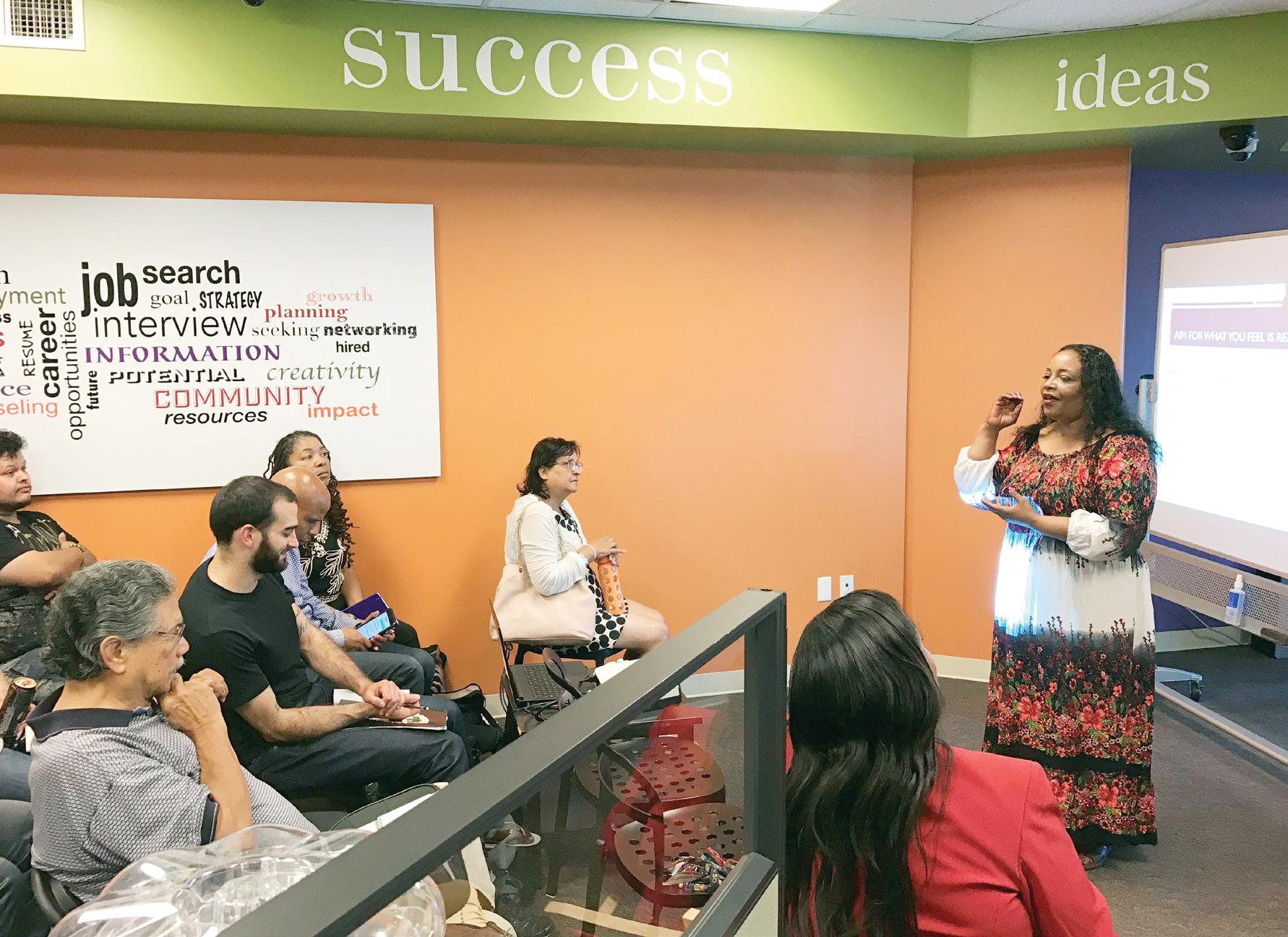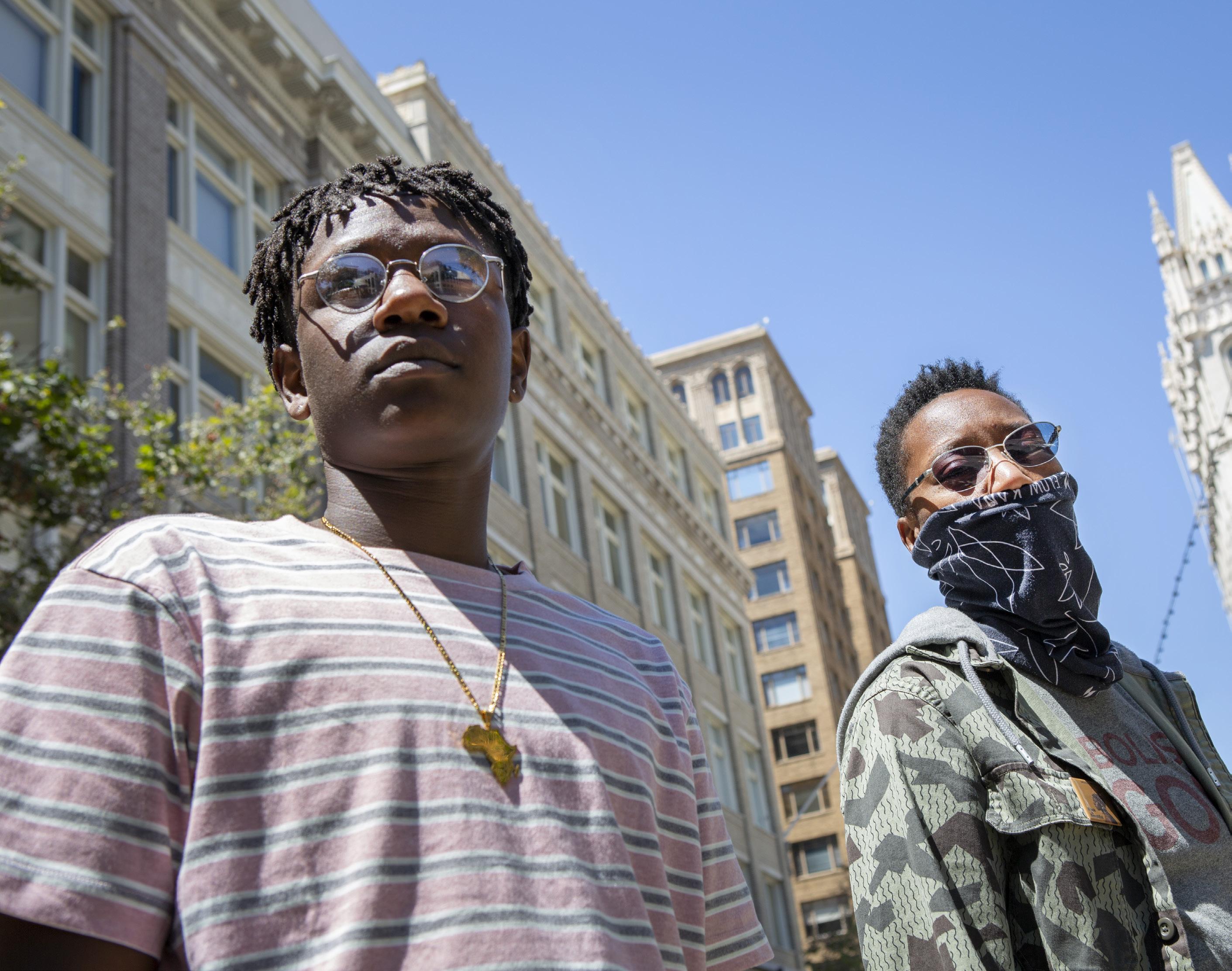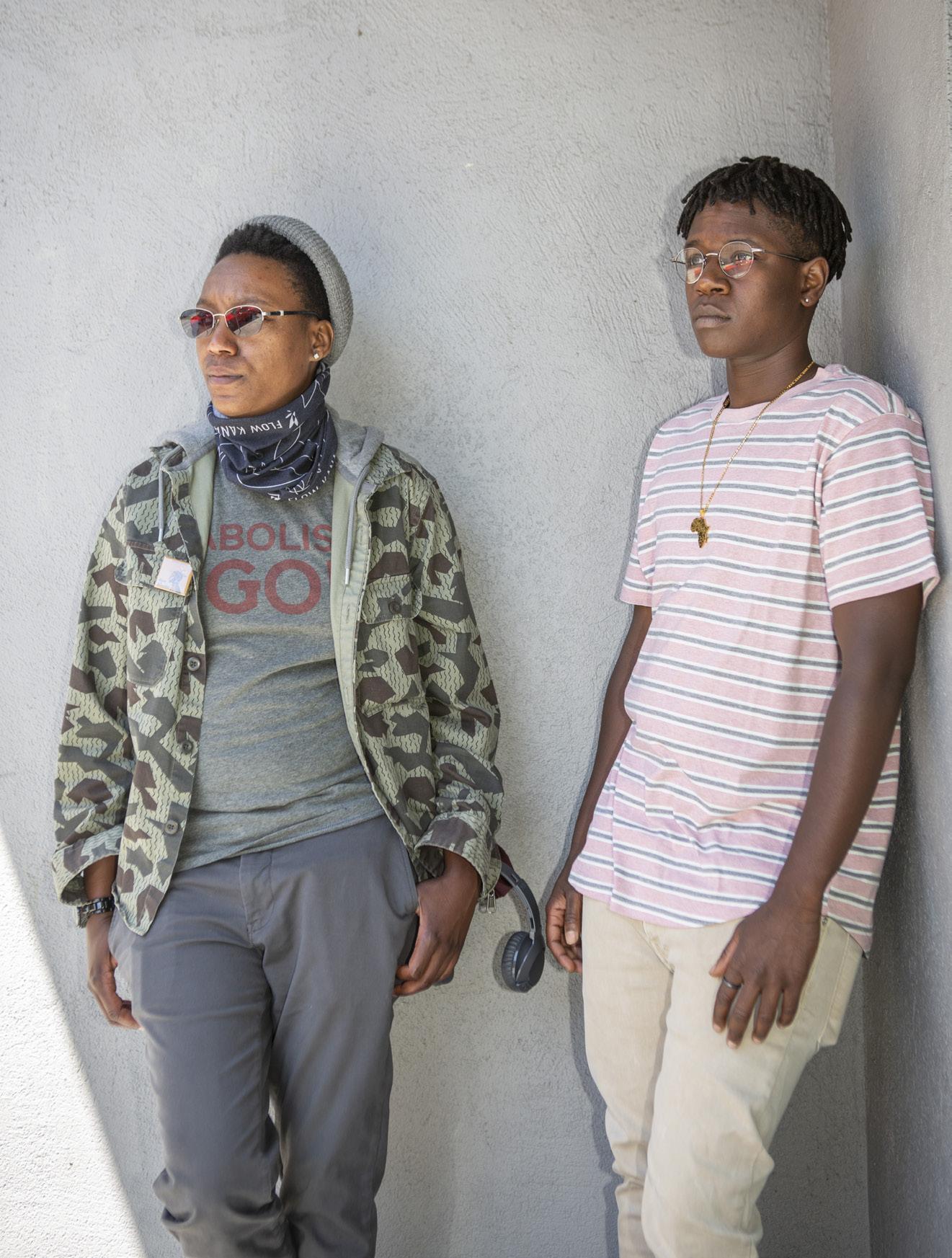
12 minute read
SUCCESS CENTERS SF
from Aug. 2020 — California Leaf
by Northwest Leaf / Oregon Leaf / Alaska Leaf / Maryland Leaf / California Leaf / Northeast Leaf
Success Centers was originally founded by Superior Court Judges in 1983 as an avenue for education and employment for the youth in San Francisco’s juvenile detention facilities. Almost four decades later, they’ve evolved to offer their Equity for Industry program - where the life-changing opportunities now include training to work in the legal Cannabis industry.
WHERE DOES ONE USUALLY BEGIN THEIR JOURNEY WITH THE PROGRAMS OFFERED BY SUCCESS CENTERS?
Liz: Our outreach is vast and I think our best referrals come from individuals who have been beneficiaries of our work. It could start at our career center, through our schools or one of our training programs. We get funding from the federal, state and local levels, as well as a number of foundations. Individuals could be brought in by one of our board members. We conduct community outreach activities that we call ‘Breaking Barriers’ - attending trade shows and job fairs, and visiting public housing properties where we encourage marginalized people to come in and take advantage of our resources.
DO YOU OFFER SERVICES TO ADULTS AS WELL AS THE YOUTH? WHY IS IT IMPORTANT TO FOCUS EFFORTS ON THE YOUNGER COMMUNITY MEMBERS?
Liz: Absolutely. They are probably equal in percentage to adults, because youth these days is 18 to 24-years-old. We’ve broadened our scope to help anyone who is able to work. Our general population starts from 16 to 99-years-old, if you are still interested and willing.
Most of the young people that we’ve worked with have not had a quality experience through the educational system and are individuals who have been marginalized through some social structure.
They’ve never seen work modeled for them; they’re coming out of foster care, juvenile justice systems, haven’t had good adult male role models - let alone relationships. We target young people so we can help them get on a trajectory to ensure their success.
We want to try and connect them to opportunities that will enable them to increase and enhance their earning potential to create wealth. 80% of the young people that we meet inside the juvenile justice facilities or the jails have committed crimes that are of economic nature.
We want to teach them to use those transferrable skills to function in the legitimate state, and to give them the resources and tools in which to do so.
All of our training programs have a very strong hands-on component. Our construction training program teaches the individuals the basic trade to build tiny houses, including the theoretical components of the construction job. The other half of the day includes understanding the acumen it requires to be successful in that industry. Such as, the requirement of waking up early in the morning to get to a construction job. Angela has built in the same kind of rigor that is specific to the Cannabis industry within her Equity for Industry program.
HOW HAS THE WAR ON DRUGS CHANGED OVER TIME TO NEGATIVELY IMPACT THESE LOCAL COMMUNITIES?
Liz: We were started in the early 1980s, as a result of the War on Drugs. Crack cocaine sales and drug sales were at an all-time, epidemic high. We saw a number of mainly Black, some brown, young people overflowing the judicial system and filling up the detention facilities. That’s how we got started, five judges.
Our community has been decimated by crack cocaine use, drug use - and where folks have not become addicted to drugs, the infrastructure of the family has been destroyed by separating family members and incarcerating them. Leaving kids with one parent or sometimes no parents, it has debilitated our community for decades. It has had a grave impact on the outcome of the people’s lives that we serve.
They come to us with little to no education, underemployed, no employment, traumatized by the destruction of the community. They give us a chance to help them move into a space where they can legitimately take care of their families.
That’s why its important for us to not only point folks in the right direction by giving them the theory, but to also hold their hands and give them the practicum they need to be able to expedite their learning to get to a place where they can thrive.
Angela: What makes me really excited is to try to bring back some of what was lost and work with folks who were definitely devastated by the War on Drugs. And try to get them to be a part of this industry by working with equity applicants here in San Francisco.
WHAT IS A COMMON CONCERN/OBSTACLE THAT MOST PEOPLE WOULD NOT KNOW THAT CANNABIS SOCIAL EQUITY APPLICANTS FACE?
Angela: The War on Drugs has created a disparity of wealth in our community here in San Francisco, and the equity programs were supposedly created to connect equity applicants with folks who have the means to get things up and running. The other main problem here is the real estate. We’re trying to connect with folks who are really interested in working with equity applicants, who aren’t trying to give them terrible contracts. This program is about creating generational wealth, but a bad contract with a partner can stop that from happening. I’m hoping that in the future we will come across investors who truly believe in the inclusiveness and fairness of the Cannabis culture. The portion of Cannabis tax money going to the state that is supposed to go back to the community, that needs to be allocated to the equity program. It’s a very slow process to get approved, which could lead you to paying for your property for up to three years while licenses are being finalized.
Liz: The Cannabis Oversight Committee in the Office of Cannabis is a place for the community to request and share information on the process, but it is slow and their office is staffed with only a few people. With all the taxes charged on Cannabis, that money should be put directly back into building infrastructure to provide more opportunities for social equity applicants and programs to thrive.
ARE THERE COMMON SKILLS FROM OUTSIDE INDUSTRIES THAT CAN BE APPLIED TO CANNABIS? WHAT ARE THEY?
Angela: Of course. Director of Operations isn’t much different in the Cannabis space, besides the compliance and rules. Someone who does marketing from another industry could also come in and do work in the Cannabis space, with a little bit of tweak on the nuances.

CEO LIZ JACKSON & EQUITY FOR INDUSTRY PROGRAM MANAGER, ANGELA WHITE
Liz: 80% of the things our participants were doing before joining us were for an economic need. I can’t imagine the kinds of skill it would take to sell stolen goods or solicit anything to anybody. When I meet a young person that can sell well, that’s a talent and a skill that we can easily transfer to give them an opportunity to be in customer service.
Those innate skills that they’ve developed or created over the years can be transitioned to any industry. If you’re willing to stay up all night long and work 20 hours a day, you know you have entrepreneurial skills.
When they go to jail, that kind of industry is run by the same corporations that are here in communities, and wouldn’t give them a chance in the first place.
The only difference is they’re paying them 17 cents an hour, as opposed to 27 to 37 dollars an hour to do the same work. The onus can’t only be on our participants. It has to also be on the business community and economic drivers out there to see the value in these people and compensate them for the work that they do.
WHAT TYPE OF WORKSHOPS ARE YOU HOSTING ONLINE (EVERY OTHER WEDNESDAY) THROUGH THE EQUITY FOR INDUSTRY PROGRAM?
Liz: Learning the lingo is one of the barriers the industry has, and that’s what we teach in one of our workshops. The street name for a joint is a joint, but in the industry we call them pre-rolls. Terpenes and trichomes on the street would be referred to as the smell and taste, or hair and crystals. We know what that stuff is, but the industry has changed the language and folks are confused. We’re helping people understand that they know what part of Cannabis is being referred to, but the terms are just different.
Angela: We’re constantly bringing industry professionals in to discuss Cannabis specific nuances, from understanding contracts and nondisclosure agreements, to how to handle a cashonly business. Our workshops are free to everyone, because we know our community doesn’t have the means to pay for these lessons.
We’re partnering with Oaksterdam University to give scholarships to community members.
One is the Cannabusiness Seminar that covers everything from purchasing the plant to how to do a security layout of your building, and there’s the horticulture class.
We also offer a trip to a farm in Salinas to see a greenhouse grow and observe in real time what they learned at Oaksterdam University.
SUCCESSCENTERS.ORG | @SUCCESSCENTERS

HOOD INCUBATOR
Co-founders Lanese Martin & Ebele Ifedigbo discuss what’s next for the Black-led, Bay Area-born organization committed to reversing the harmful impacts of America’s drug war.
WE COULD USE A LOT MORE PLACES LIKE HOOD INCUBATOR IN THE WORLD.
Founded by Lanese Martin and Ebele Ifedigbo in 2016, Hood Incubator is an organization with the stated goal of “ending the drug war and reversing its harmful impacts on Black communities.” Initially, Martin and Ifedigbo focused on their local community in Oakland with a business accelerator, assisting hopeful Cannabis entrepreneurs with the resources, training and mentorship required to land a permit with the city.
“There was this wave of Cannabis legalization happening, first in Colorado and then in these other Pacific Northwestern states,” said Ifedigbo of their motivation to partner with Martin on Hood Incubator. “We were seeing a trend of the industry being whitewashed. Knowing that California is a leader in this industry - and seeing that some of the factors that we needed to do this work were already in place there - we decided to launch here, in Oakland, and pick up the work from there.”
However, as time has gone on, it has become apparent to Hood Incubator’s founders that focusing too intently on Cannabis justice is akin, in Martin’s words, “to putting on a Band-Aid, but a bunch of blood keeps flowing out.” In this case, blood is taking the form of housing instability, voter disenfranchisement, and the large scale refusal of public institutions and private businesses to fund Black-led endeavors.
“That’s when we realized that we needed to start organizing people to make sure they understood these systemic issues,” Martin explained by phone to California Leaf. “We also want them to know that they have the skillset to dismantle them, both in their local communities as well as nationally. That’s what led us to the current work we’re doing.”
That new work has largely taken the form of organizing and networking. Martin is currently working to add a handful of national Hood Incubator affiliates across the country. With soft verbal agreements currently in place with existing organizations in cities like Chicago, Los Angeles and Buffalo, NY, Martin is hoping her organization can assist with eliminating redundant policy conversations by bringing people with past experience together.
“New York City shouldn’t be talking about legislation that Oakland or Los Angeles has already tried and learned doesn’t work,” Martin explained. “You can learn from something that Chicago did or something that St. Louis did, so The game speaks to what Hood Incubator’s founders feel is the we really need to make sure that we start having next chapter in the battle: shining a spotlight on the intertwined these conversations together, especially at the histories of past federal drug policy and the demands for justice local level.” now emanating from streets across the country.
Even as Hood Incubator looks to expand its “Our organizing tenet is to meet folks where they’re at and footprint, it still continues to offer the services that to provide that direct service,” Martin said. “Then you can start first cemented the organization as a vital asset to building the base for the larger issue and that’s what we’re the community. That includes doing. What we have now is a group the aforementioned “Cannabis Accelerator” program, which consists of eight sessions held BY CONNECTING THE DOTS BETWEEN POLICY, POT AND of people who don’t know how a bill becomes a law outside of that cartoon that we got to watch in over four weeks. In a three series intensive course, participants learn about power THE POWER OF THE VOTE, HOOD INCUBATOR HOPES elementary school - if they showed it to you.” By connecting the dots between (both generally and as it relates TO HELP LOCAL COMMUNITIES policy, pot and the power of the vote, specifically to the Cannabis industry), as well as technical skills and campaign development. HARNESS THEIR COLLECTIVE STRENGTH. Hood Incubator hopes to help local communities harness their collective strength. Part of that work involves
While those offerings cater reframing and reinvigorating the to individuals ready to make a conversation around the idea that the fight doesn’t end with a full professional commitment to Cannabis, Hood Cannabis permit. Martin points to grassroots campaigns like Ban Incubator also features more laid back, drop-in the Box and Defund the Police as examples of the broader coacurriculum as well. litions that she wants to see Cannabis activists align themselves
One example is their “Higher Learning” series: with - if true change is the desired outcome. a monthly gathering to discuss an item of news “We want to tell people that you have the power to dismantle or work of art related to the intersection of Black the impact of the drug war,” Martin said. “It’s less about ‘you’re life and the war on drugs. Martin also previews making money while my cousin’s still in jail.’ It’s about giving an upcoming ‘virtual edutainment experience’ in people the opportunity to get the full, political education of what the form of an online trivia game that will provide went down and what their role is in keeping the status quo. More players both with fun Cannabis facts, as well as importantly, we want them to understand what their role can be in foundational information on the drug war and its dismantling the status quo, so that we can get to the shared vision lasting impacts. of justice that we want.” LEARN MORE AT HOODINCUBATOR.ORG










